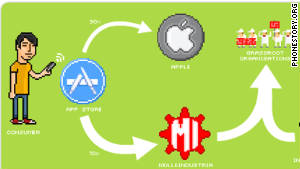As the most profitable consumer-electronics company in the world, Apple has been front and center of discussions about all of those issues.
Paolo Pedercini, the game's Italian developer, posted a blog item on his Twitter feed Tuesday announcing the app had been pulled under the header "Phone Story RIP (13/09/2011 - 13/09/2011)."
He said Apple cited sections of its guidelines that ban apps that depict violence or abuse toward children, "excessively objectionable or crude content" or paid apps that solicit donations to causes.
The game's website says proceeds go to workers' groups and other nonprofit organizations.
In response, Pedercini said he's planning a new app that "depicts the violence and abuse of children involved in the electronic manufacturing supply chain in a noncrude and nonobjectionable way."
Apple's response was succinct.
"We removed this app from the App Store because it violates its developer guidelines," said Apple spokesman Tom Neumayr. Neumayr would not elaborate and didn't confirm or deny that the sections Pedercini cited are correct.
The game is still available for $1 in the Android Market.
It's not the first time Apple has been embroiled in controversies over electronics production (which, in fairness, are the same for many manufacturers of computers, phones and other gadgets).
Wired magazine, for one, has taken a close look at conditions at the Foxconn factory in China that makes iPhones.
The report describes nets strung around the building after a rash of worker suicides.
Amnesty International and other organizations have decried the way coltan, a mineral necessary for mobile phones, is mined in the Democratic Republic of Congo -- where there are reports of bloody violence to control the coltan trade and deadly conditions for workers held in slavelike conditions.
One Amnesty documentary calls it "Blood Coltan," comparing the mineral to the "blood diamonds" mined in some African nations.
And environmental groups such as Greenpeace have blasted Apple's environmental impact, saying its products contain hazardous chemicals and their short life spans have led to massive waste.
On its site, Apple lists "supplier responsibility" actions it takes to ensure "the highest standards of social responsibility wherever our products are made."
"We insist that our suppliers provide safe working conditions, treat workers with dignity and respect, and use environmentally responsible manufacturing processes," the page says.
Apple's site says it regularly audits the companies it partners with and works with those firms to make improvements when needed.

